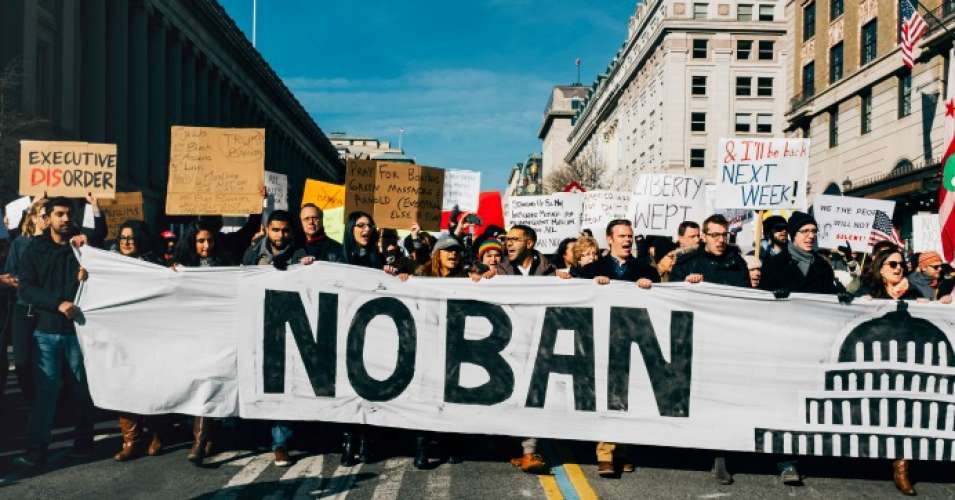The National Coalition Against Censorship (NCAC) joins PEN America and 31 other prominent arts organizations in a friend of the court brief in the case of State of Hawaii v. Trump, urging the Supreme Court to strike down the third version of the Trump travel ban issued in September 2017. The case will receive a hearing in the Supreme Court on Wednesday, April 25. Arts organizations argue that the ban has damaged artists’ freedom of movement and seriously inhibits the creative freedom and free flow of ideas the First Amendment is designed to protect.
Executive Order (EO) 13780 bans all immigration from six majority Muslim countries, places additional visa restrictions on nationals of Syria, Iran, Libya, Somalia, Yemen, and Chad, and includes token restrictions on North Korea and Venezuela.
The travel ban violates Americans’ First Amendment right to receive information by preventing citizens from interacting with the ideas and viewpoints of nationals of the targeted countries. The ban is devastating to artists and cultural producers vulnerable for speaking out in repressive regimes. Those artists look toward the US as a place enabling them to work freely. Even in its brief implementation thus far, numerous artists have had visas denied or delayed and countless Americans have lost the opportunity to engage with their work. In addition to artists from the countries named in the ban, overall artistic mobility has fallen precipitously and the broader climate of increased hostility towards Muslims and immigrants in the US has forced many artists – here and abroad – to make difficult decisions about the risks they are willing to take for their art. Several artists’ stories are below.
Svetlana Mintcheva, Director of Programs at NCAC, said, “In a troubled and divided world, we need more understanding, not greater divisions. It is the voices of artists that help us understand, empathize, and see the common humanity underlying the separations of political and religious differences. Silencing these voices is not likely to make us any safer.”
Freedom of artistic expression is fundamental to a free and open society. Creative expression catalyzes social and political engagement, stimulates the exchange of ideas and opinions, and encourages cross-cultural understanding. It fosters empathy between individuals and communities, and challenges us to confront difficult realities with compassion.
The brief also highlights the many contributions of immigrants, refugees and visitors to American culture, stating: “It is no coincidence—but rather an animating principle—that refugees have created many of the works that define what it means to be an American.”
Artists’ Stories:
Syrian Dancers Forced to Modify Performance
Syrian choreographer Mithkal Alzghair was scheduled to perform his piece “Displacement” at Cincinnati’s Contemporary Arts Center in January 2018. The piece includes three dancers, including Alzghair, and is inspired by the lives of people living in a Syria ravaged by civil war. Alzghair and his two fellow dancers, with the help of an immigration attorney, sought a waiver to enter the US despite the travel ban and remained unsure if the performance would be able to go on until days before the scheduled opening. Ultimately, Alzghair and one dancer received waivers, while the third did not. The two men performed the piece in front of a video projection showing the piece as intended, with all three dancers.
Iraqis Fear Participating in Cultural Exchange
Michael Rakowitz conceived a large-scale performance on Independence Mall in Philadelphia as part of a radio series entitled Radio Silence. The project weaves narratives of contemporary Iraqi life, the refugee experience and Iraq’s culture and history, as well as the experiences of Iraqi-Americans. The performance was scheduled for July 2017, but when the travel ban was reinstated in June, many of the participants living in the US withdrew or asked to diminish their participation for fear of the prevailing anti-Muslim sentiment. They feared for their chances to receive asylum, to reunite with their families, to endanger their loved ones. They were made to feel afraid of participating in a performance intended to educate and celebrate. The project was ultimately delayed for nine months and Rakowitz lost approximately 40% of his original material.
Oscar-Nominated Producer Initially Denied Visa to Attend Academy Awards
In February 2018, Kareem Abeed, producer of the Oscar-nominated documentary film Last Men in Aleppo, initially had his visa denied as a result of President Donald Trump’s travel ban, showing the absurd and unjust consequences of the ban for the free exchange of artistic discourse across borders. Abeed was eventually permitted to travel, but only after major public outcry.
Somali Musician Forced to Cancel Residency
Aar Maanta, a Somali-born musician who has lived in London since the late 1980s, was scheduled for a weeklong, grant-funded residency at Minnesota’s Paramount Center for the Arts in September 2017. Although every other member of his band received visas, Maanta’s visa, even without full travel ban implementation at the time, was so delayed (due to “additional administrative processing”) that he was forced to cancel the residency.


